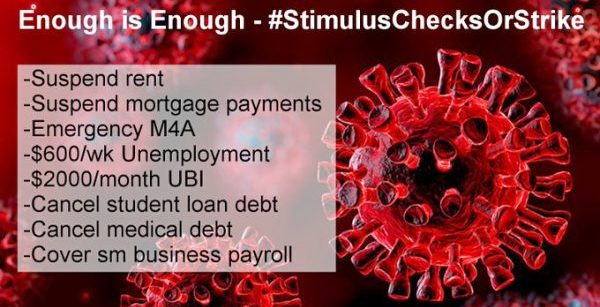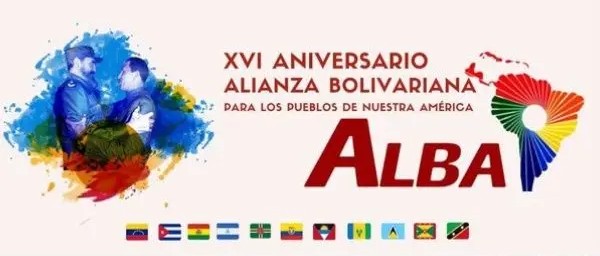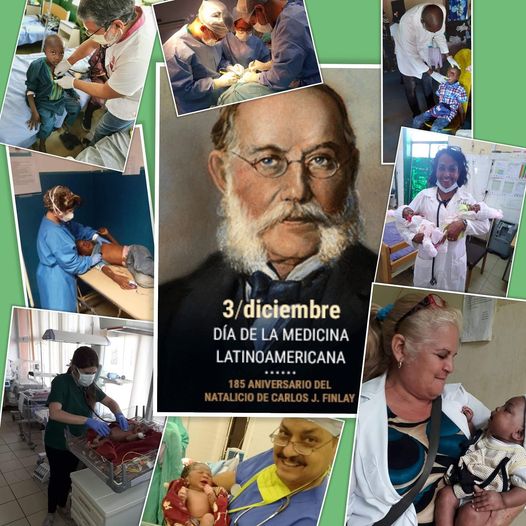
|
December 19, 2020 - No. 49 Out of Control Pay-the-Rich Schemes The Arrogance of Monopoly Right • Government Corruption Beyond the Pale •
Exposing
the
Fraud of the Canada Emergency
• "Yellow Peril" Hysteria All Over Again -
Pauline Easton -
For Your Information United States • Majority of Electoral College Votes Go to Biden • Supreme Court Dismisses Texas Lawsuit Which Attempts to Invalidate Votes in Four States - Voice of Revolution - • Civil War Talk of Secession and Treason - Kathleen Chandler - • Pentagon
Funding
for War and Weapons Passes, • Nineteen Tragic Facts About the COVID-19 Economy - Bill Quigley -
• ALBA:
16 Years of Life • Day of the Titans and Heroic Guerrillas in White Coats - María Inés Álvarez Garay - • Mexico's Water in the Hands of Private Interests • Concern
in
Peru Over Increasing Number of
• Ending the Year in the Red Zone and Under Lockdown
• It
Is Up To Canadians, Not the Police, to
Decide What Out of Control Pay-the-Rich Schemes The Arrogance of Monopoly Right
The arrogance of monopoly right is such that the oligarchs make no bones about their "entitlement" to the wealth workers produce and the public funds collected by the state. Alain Bédard, Chief Executive Officer of the North American transportation cartel TFI International, manoeuvred the federal government's wage subsidy program -- Canada Emergency Wage Subsidy (CEWS) -- into giving his company $63 million. The amount paid up to the end of September is still growing as the government has extended the pay-the-rich scheme into the new year. The $63 million in public funds Bédard's company received soon disappeared into the accounts of his cartel becoming indistinguishable from the over $1 billion in annual gross income. Despite the pandemic and state-declared emergency and public money in their coffers, company funds flowed out to shareholders and executives in the form of $45 million in stock dividends, $9 million to buy back company shares, $20 million in stock options given to company executives and, with a slap in the face of the working class, the layoff of 1,600 TFI workers.
Rumblings began to surface in social media that public funds should not be going to profitable companies or to those that simply turn around and hand the government cash to owners and executives or use it to buy back shares to increase the stock price. Reports appeared that government funds handed out to private interests were being used to fatten the pockets of the rich. Such was the case with long-term care operators Extendicare and Sienna Senior Living. Upon receiving $157 million in public funds, the companies turned around and gave their shareholders $74 million. Meanwhile, workers and residents in their facilities continued to suffer terribly with reported deaths from COVID-19 reaching 480 by early autumn. Elsewhere, the Financial Post (FP) discovered 68 major companies had received $1.03 billion in CEWS public payments during the second and third quarters of 2020 but at the same time paid out more than $5 billion in dividends to investors. Many of those companies, similar to TFI International, introduced share repurchase programs to buy back millions of dollars in shares during the two quarters, gave out share options to executives and paid hefty dividends to shareholders.
Regarding the CEWS pay-the-rich scheme, FP quotes York University professor Richard Leblanc saying, "Think about what's happening: Taxpayers are indirectly subsidizing payments to shareholders. That is completely unacceptable." Another professor, Michel Magnan who teaches corporate governance at Concordia University said of this particular pay-the-rich scheme and practice, "If you buy back your shares it's because you don't need the cash. So if you don't need the cash, why are you getting cash?" Trickle-down Theory of the RichTFI International CEO Alain Bédard angrily responded to the criticism telling Le Journal de Montréal that we oligarchs "are not ashamed" to take $63 million in government money and in the same instance hand over $45 million to share owners as dividends, give $20 million in stock options to executives and use $9 million to buy back shares to boost the share price. "Not taking [the government payout] would be like refusing a tax exemption. It would be like saying 'We're more Catholic than the pope.' We're in business for our stockholders," Bédard blustered.
Yet reports swirling in the media suggest that wealth currently is not trickling down to the masses at all but on the contrary flowing up to the global oligarchs who have massively increased their wealth during the pandemic. Share prices of the biggest cartels on most of the imperialist stock markets have reached record highs in 2020 while unemployment remains high, poverty and food insecurity are disturbingly widespread and many small and medium-sized companies are struggling just to survive. Unprincipled
Line that the End Justifies the Means
|
|
|
United States
Majority of Electoral College Votes Go to Biden
The slate of electors certified by each state's election officials and signed off on by the Governor met in each state on December 14 to cast their votes for president and vice-president. Currently all states designate electors based on the votes cast in their state, with all but Maine and Nebraska giving all their electors to whoever gained a plurality, not a majority, of the votes. For this election, there were 538 electors and 306 votes were cast for Biden and 232 for Trump.
 Following the
vote Biden claimed, "The flame of democracy was
lit in this nation a
long time ago. And we now know nothing, not even a
pandemic or an abuse
of power, can extinguish that flame." Referring to
the Texas lawsuit
calling to vacate the vote in four states and
dismissed by the Supreme
Court December 11, he added, "It's a position so
extreme we've never
seen it before. A position that refused to respect
the will of the
people, refused to respect the rule of law, and
refused to honour our
Constitution."
Following the
vote Biden claimed, "The flame of democracy was
lit in this nation a
long time ago. And we now know nothing, not even a
pandemic or an abuse
of power, can extinguish that flame." Referring to
the Texas lawsuit
calling to vacate the vote in four states and
dismissed by the Supreme
Court December 11, he added, "It's a position so
extreme we've never
seen it before. A position that refused to respect
the will of the
people, refused to respect the rule of law, and
refused to honour our
Constitution."
Republican Senate head Mitch McConnell, a main Trump enforcer, also emphasizing the importance now of defending existing arrangements said, "Our system of government has processes to determine who will be sworn in on January 20." He added, "The Electoral College has spoken. So today, I want to congratulate President-elect Joe Biden." He had not done so up to that point. Trump, following the Supreme Court's rejection of the Texas lawsuit, tweeted, "We have just begun to fight." He has so far not conceded.
In Michigan, a state where Trump had tried to have the vote vacated and had called on the Republican leaders of the Michigan House and Senate to seat a slate of electors in his favour, both instead spoke to upholding existing arrangements. House Speaker Lee Chatfield said that he "can't fathom risking our norms, traditions and institutions to pass a resolution retroactively changing the electors for Trump." He added that if the Michigan House were to cast a new slate of electors "I fear we'd lose our country forever. This truly would bring mutually assured destruction for every future election in regards to the Electoral College."
It is evident that there is growing concern that the continuing conflicts represented by Trump's refusal to concede have not only put the election in doubt but will further undermine the existing constitutional arrangements that guarantee rule by the oligarchs. These arrangements have proven dysfunctional, the conflicts border on violent civil war, yet upholding the Constitution -- which did not prevent the last Civil War -- is the only answer given.
Congress still has to accept the vote by the Electoral College. The Senate and House of Representatives meet January 6 in a joint session presided over by Vice President Pence, as President of the Senate. He is responsible for counting the Electoral College votes from each state. If at least one member of each house objects in writing to a particular state's electoral votes, the House and Senate meet separately to debate the issue. Both Houses must vote to sustain the objection, otherwise, the votes get counted as intended by the state. If there is a tie, the vote certified by the Governor of the state decides the outcome.
Republicans in Georgia met December 14 and elected a slate of electors in Trump's favour, though the Governor there certified Biden's win and the Electoral College vote went to Biden. The Republicans have not yet sent their slate of electors to Congress, but they could. Other individual members, such as those supporting the Texas lawsuit, could object as well. So far no Senator has come forward and McConnell has urged them not to, trying to avoid a vote that could further split Republicans. At least four Republican Senators have said they would oppose any such move: Patrick J. Toomey of Pennsylvania, Susan Collins of Maine, Lisa Murkowski of Alaska and Mitt Romney of Utah. This would be enough to block any effort to overturn the Electoral College results. Given this, Trump is more likely to pursue other avenues, though his supporters might persist.
Supreme Court Dismisses Texas Lawsuit Which Attempts to Invalidate Votes in Four States
Texas State Attorney General Ken Paxton filed a lawsuit December 7 directly with the Supreme Court calling on the court to invalidate the elections in Georgia, Michigan, Pennsylvania and Wisconsin, which would put Biden below the 270 Electoral College votes needed to win. The lawsuit asked the court to vacate the votes cast and instead let the legislatures of each state decide the slate of electors for the Electoral College. On December 11, the Court dismissed the case.
Unlike
the more than 50 other lawsuits filed, and lost,
by Trump and allies
claiming fraud, this one attempted to make it a
constitutional issue
which, as such, was a matter which pertains to the
Supreme Court. Given
that the case involved a dispute between states,
it bypassed lower
courts and went directly to the Supreme Court.
The lawsuit argued: "The constitutional issue is not whether voters committed fraud but whether state officials violated the law by systematically loosening the measures for ballot integrity so that fraud becomes undetectable." It said it was not necessary to prove that fraud occurred, "it is only necessary to demonstrate that the elections in the defendant States materially deviated from the 'manner' of choosing electors established by their respective state Legislatures."
It is notable that changes made in the four states, such as expanding use of mail-in ballots, were also made in Texas and most states across the country. Furthermore, the challenge was only for the presidential election, not Congressional and state elections, even though each voter gets one ballot for all the elections. It is a self-serving irrational argument meant to draw everyone into an irrational debate. Thinking about a rational solution favouring the people is blocked while various divisions -- between states, between states and the federal government, and among the electorate -- are fomented.
While other lawsuits involved claims of fraud in specific states, the Texas lawsuit directly served to pit groups of states against each other. It was joined by State Attorneys General from 17 other states, about half southern states.[1] In addition, 126 of the 196 Republicans in the House of Representatives also filed a brief in support.
The four states targeted -- Georgia, Michigan, Pennsylvania and Wisconsin -- all challenged the lawsuit. State Attorneys General from 20 other states and Washington, DC filed a brief in support of the four states. These included North Carolina, Virginia, California and New York.[2] Lead Connecticut Attorney General Tong said: "This is nothing less than an attempted legal coup that risks the destruction of the union. This suit will undoubtedly fail because it is a fact-free disgrace to the judicial system. But before it fails, it will cause immense and lasting harm to the legal profession and the community of attorneys general..."
Pennsylvania wrote, "The court should not abide this seditious abuse of the judicial process, and should send a clear and unmistakable signal that such abuse must never be replicated." Georgia's Republican Governor and Attorney General, who have faced threats and harassment from Trump and his forces, said Georgia had done "what the Constitution empowered it to do."
Texas Republican Senator John Cornyn rejected the lawsuit, saying he did not understand why Texas is seeking to dictate how other states run their elections.
The Republican Attorney General of Ohio refused to support the lawsuit as did Republican Governors of Utah and Wyoming. The Governor of Wyoming, where Trump won 70 per cent of the votes cast, said he and his attorney general, "Believe that the case could have unintended consequences relating to a constitutional principle that the state of Wyoming holds dear, that states are sovereign, free to govern themselves."
In this manner the role of the states, their election laws, legislatures, Electoral College electors, and federal government is being raised, with elected officials on both sides claiming support from the Constitution. As well, state Attorneys General are sworn to uphold the Constitution and state laws yet here they are vying against each other, often in an irrational manner that puts into question the very laws they are sworn to uphold. Their own system of justice is in disarray and threatening "destruction of the Union."
On December 11, the Supreme Court did not allow the case to be filed, saying that Texas did not have standing to dispute election law in other states. Justice Alito, joined by Justice Thomas, raised a technical issue, saying the lawsuit could be filed, but not that the Court should agree to hear the case. Alito added, "I would not grant other relief, and I express no view on any other issue."
Trump, in support of the Texas lawsuit, said: "This is the big one. Our Country needs a victory!" and "We will soon be learning about the word 'courage', and saving our Country." After the ruling he condemned the Supreme Court saying, "No Wisdom, No Courage."
Prior to this, on December 8, the Supreme Court issued another ruling in which it refused to provide injunctive relief for one of Trump's Pennsylvania lawsuits. That lawsuit, also asking for the state legislature to decide the slate of electors, had been dismissed by the Pennsylvania Supreme Court. It is rare for the U.S. Supreme Court to intervene in a state court ruling on state law.
Trump's persistence in striving for federal intervention into state-based elections is indicative of the restructuring of elections he and allies are striving for. The lawsuits, even when lost, are a means to promote the need for greater federal control over elections, including the casting, counting and certifying of votes.
Trump and allies are continuing their efforts to secure the power of the presidency. This includes issuing threats of violence against state officials, Republicans and Democrats alike. Trump is also in a position to foment violence using armed militias to attack the people and try to justify declaring a national emergency prior to the January 20 Inauguration Day for Biden. Already, one of these militias, the "Proud Boys," has torn down and burned Black Lives Matter banners at African-American churches in Washington, DC. Militia members are roaming the streets there and attacking people, with little interference from police. The many who have been fighting for justice and equality and defending the right to vote continue to stand ready to act if Trump acts to more broadly foment violence or refuse to leave the White House.
Demonstrations in many cities are already planned for December 31 and January 20.
Voice of Revolution is a publication of the U.S. Marxist-Leninist Organization.
Notes
1. States whose Attorneys General supported the Texas lawsuit include: Alabama, Arkansas, Florida, Indiana, Kansas, Louisiana, Mississippi, Missouri, Montana, Nebraska, North Dakota, Oklahoma, South Carolina, South Dakota, Tennessee, Utah and West Virginia.
2. States whose Attorneys General opposed the Texas lawsuit include: California, Connecticut, Colorado, Delaware, Hawaii, Illinois, Maine, Maryland, Massachusetts, Minnesota, Nevada, New Jersey, New Mexico, New York, North Carolina, Oregon, Rhode Island, Vermont, Virginia and Washington, DC.
Civil War Talk of Secession and Treason
The U.S. Civil War officially ended 155 years ago. Despite this, civil war talk mentioning secession and treason have become commonplace. The Texas lawsuit which called on the Supreme Court to vacate the votes cast for president in Georgia, Michigan, Pennsylvania and Wisconsin pitted groups of states against each other, 17 in support and 20 against, with both sides saying constitutional issues were being raised.
On hearing the Supreme Court ruling against the Texas lawsuit, the head of the Texas Republicans said: "Perhaps law-abiding states should bond together and form a Union of states that will abide by the constitution." In countering the lawsuit, state Attorneys General said it "risks the destruction of the Union," and that it was a "seditious abuse of the judicial process."
New Jersey Representative Bill Pascrell sent a letter to House Speaker Nancy Pelosi on December 11 targeting the 126 Republican House representatives that supported the Texas lawsuit as traitors. He tweeted, "Today I'm calling on House leaders to refuse to seat any Members trying to overturn the election and make Donald Trump an unelected dictator." He cited a Civil War amendment (Section 3 of the 14th Amendment), saying: the "Text of the 14th Amendment expressly forbids Members of Congress from engaging in rebellion against the United States." It was written "to prevent the destruction of the United States from without and within," he said.[1] Refusing to seat the 126 members would "cleanse from our government ranks any traitors and others who would seek to destroy the Union," he said. A petition is now being widely circulated calling on people to urge Pelosi not to seat the representatives.
Pelosi has not responded directly. However, in a letter to colleagues December 11, she referenced the 126 House Republicans and said the Texas lawsuit "violates the principles enshrined in our American Democracy." She referred to Pennsylvania's statement about "seditious abuse of the judicial process," and concluded saying, "As Members of Congress, we take a solemn oath to support and defend the Constitution. Republicans are subverting the Constitution by their reckless and fruitless assault on our democracy which threatens to seriously erode public trust in our most sacred democratic institutions."
This talk from both sides of the divide in fact makes it clear that the Constitution carries little authority in resolving disputes. Both sides claim to have its backing. The ease with which they throw accusations of secession and treason around or claim to defend "sacred democratic institutions" attests to the fact that they are going crazy unconcerned.
If the "sacred democratic institutions," including Congress and elections, were functioning to resolve disputes as intended when they were conceived, nobody would be calling on hooligan armed militias or appealing to the Supreme Court to intervene in state affairs or making calls to secede and form a new Union or to "cleanse Congress of traitors."
These institutions do not accord with today's conditions where the conflicts between contending private interests striving to profit from pay-the-rich schemes are insatiable and the times require people's empowerment.
Even if Trump leaves office, which he has not yet conceded, the conflicts among the ruling factions border on open violent civil war. Biden's election will not make them go away. His agenda is no less dictated by the ruling financial oligarchy and its demands to continuously pay the rich. The section of the financial oligarchy which seeks to dominate does not tolerate limitations on its power posed by different levels of authority -- federal, state, city-based and the like. This also includes any expressions of national sovereignty by countries which refuse to kowtow to narrow foreign private interests, especially those of the U.S. Though Biden and those aligned with him may express themselves in ways which are different to those used by Trump in implementing the U.S. imperialist agenda, his ways will also come into even greater contradiction with the demands of the U.S. working class and peoples and the demands of the peoples of the world. Subordinating social needs to the demands of the parasitic war economy is evident in the fact that while Congress overwhelmingly passed Pentagon funding of $740 billion for war and weapons, it has not passed COVID-19 relief for workers and persists with its horrific threat of government shutdown, now set for December 21.
The open disgrace this election brought on the U.S. "sacred democratic institutions," as Pelosi calls them, is sure to give rise to calls for election reforms so long as they do not serve to empower the people and, on the contrary, strengthen rule by the rich by introducing greater federal control of the electoral process. These may include a direct vote for president and elimination of the Electoral College. Most of the Trump lawsuits attack the current system of state-based elections, including how electors for the Electoral College are chosen and who decides disputes. Various officials in Georgia, Pennsylvania, Arizona and elsewhere are also calling for changes to election laws. All are being done in the name of preserving "our sacred democratic institutions," "democracy" and "restoring the public trust."
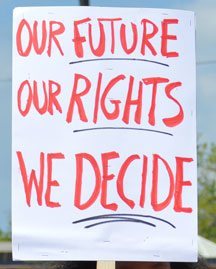 Only the people,
by organizing themselves politically on the basis
of their own agenda,
can bring into being changes which provide for
decision-making by the
people from start to finish. This includes
people's assemblies for
setting policy and raising the claims the people
are entitled to make
by virtue of being human, and selecting
representatives from among
their peers so all have equal footing and
information on problems and
solutions.
Only the people,
by organizing themselves politically on the basis
of their own agenda,
can bring into being changes which provide for
decision-making by the
people from start to finish. This includes
people's assemblies for
setting policy and raising the claims the people
are entitled to make
by virtue of being human, and selecting
representatives from among
their peers so all have equal footing and
information on problems and
solutions.
The public lost trust in elections a long time ago, with the general consciousness being that they are of, by and for the rich. The solution is not restoring faith in the dysfunctional institutions, but to give birth to new ones. Developing collectives and organizations where members are equal and together make decisions, implement them and take responsibility for the results is the way of the future.
Across the U.S., workers, women and youth of all national origins and from all walks of life are persisting in united efforts in the interests of the people. The battle for rights is a battle for empowerment, the main problem being taken up for solution, including demands for decision-making power and control of policing, budgets and health care.
Note
"No Person shall be a Senator or Representative in Congress, or elector of President and Vice-President, or hold any office, civil or military, under the United States, or under any State, who, having previously taken an oath, as a member of Congress, or as an officer of the United States, or as a member of any State legislature, or as an executive or judicial officer of any State, to support the Constitution of the United States, shall have engaged in insurrection or rebellion.
Pentagon Funding for War and Weapons Passes, COVID-19 Relief for Workers Does Not
On December 11, Congress overwhelmingly passed $740.5 billion for the Pentagon, its weapons and wars. This is for one year only. The vote in the House of Representatives for the National Defense Authorization Act (NDAA) was 335-78 and in the Senate 84-13. Both are enough for the two-thirds majority needed to override a threatened veto by President Trump. He has ten days (not including Sundays), which means by December 23, to veto, sign or allow it to become law without his signature.
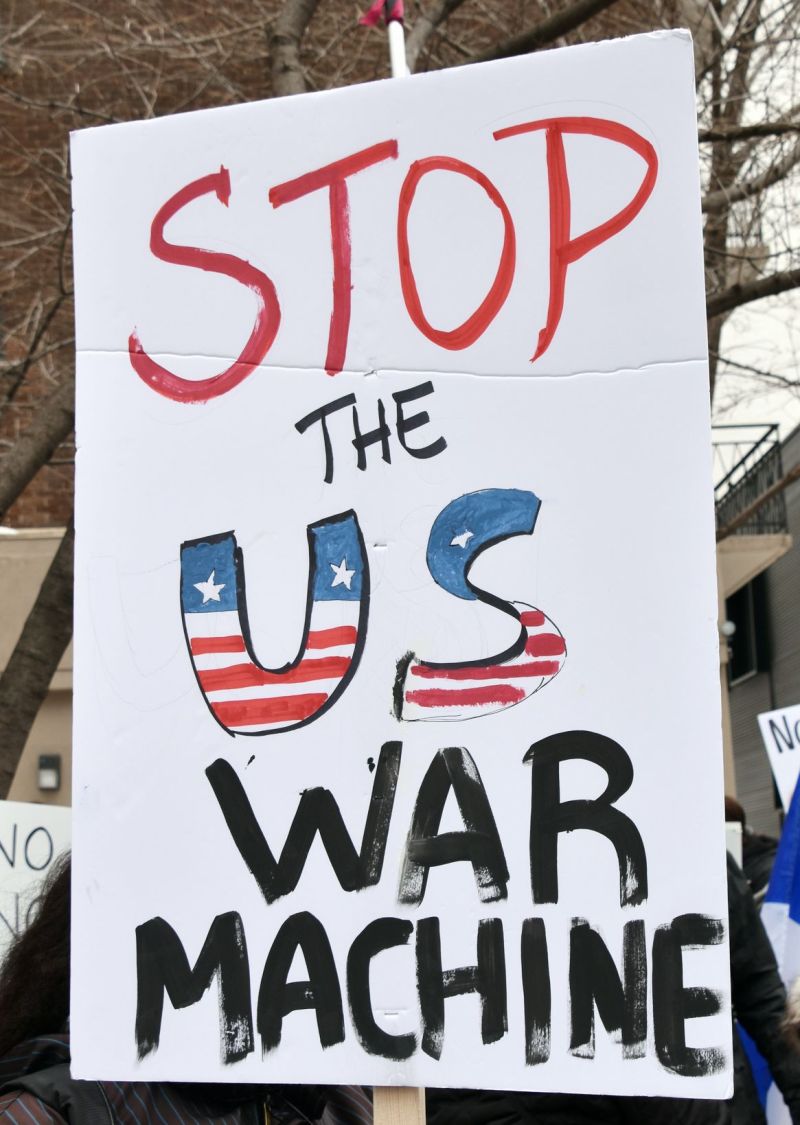 Senator Jim Inhofe
of Oklahoma
and chairman of the Senate Armed Services
Committee made clear the
pro-war stand of Congress when it comes to public
funds: "There's a
reason this bill gets done every single year for
the last 59 years:
It's the most important bill we'll do all year."
The same is not true
for COVID-19 relief.
Senator Jim Inhofe
of Oklahoma
and chairman of the Senate Armed Services
Committee made clear the
pro-war stand of Congress when it comes to public
funds: "There's a
reason this bill gets done every single year for
the last 59 years:
It's the most important bill we'll do all year."
The same is not true
for COVID-19 relief.
According to Inhofe and the vote in Congress more generally, it is Pentagon funding "that makes our country more secure, and it supports our troops who defend it." The people, through their broad and many demonstrations, have raised that security is not guaranteed through the use of force and violence, abroad or at home. Affirming the peoples' rights, including rights to health care, housing, jobs, safety and peace, is what makes the country and world more secure, not troops and weapons.
The United States has by far the largest military budget on the planet, more than the next 10 countries combined. When funding for homeland security, policing and incarceration is included, it accounts for about 64.5 per cent of all federal discretionary funds. Various additional sources of funds for war in the general budget means the Pentagon funds are more than $1 trillion every year.
The vote by Congress reflects the war economy and war government of the U.S., which the president necessarily safeguards. Biden will do so, just as Obama, Bush and others did before him. It is an economy and government that guarantee funding for war and aggression and all kinds of interference abroad, militarized policing and violence at home, while leaving the well-being of the people to chance.
Horrific Threat of Government Shutdown Continues
While
on December 18, Congress passed a two-day stop-gap
measure which
prolongs the threat of a full government shutdown
until Monday,
December 21, it remains unclear if agreement will
be reached Sunday,
December 20, for the omnibus budget bill or any
funding for COVID-19
relief.
Congress passed the the National Defense Authorization
Act
(NDAA) for the Pentagon but did not pass the
overall budget or any
COVID-19 relief. Instead another continuing
resolution was passed to
provide government funding until December 18, now
extended to December
21. While this averted a government shutdown on
December 11 and then
again on December 18, it does nothing to ease
the fears and
anxiety of the people concerning their jobs, let
alone funding for
COVID-19 relief. This would include prioritizing
funds for the people,
such as free health care for all in need, free
personal protective
equipment (PPE), testing and other aspects.
Actions by health care and other frontline workers and many community organizations are also demanding a budget that guarantees basic human rights, not policing and more pay-the-rich schemes of various kinds for the giant monopolies. Were the budget to be decided by the people there is no doubt funding for the Pentagon would be greatly cut, the pay-the-rich schemes stopped and funding increased for social services.
The estimated $300 billion needed to cover the $1,200 cheques previously issued to most adults, very insufficient funding, would take just half the Pentagon budget. Many other countries provide monthly cheques covering up to 80 to 90 per cent of wages. Demands are also being made to ensure everyone in need, including the millions of undocumented immigrants and their children, is included in any cash payments.
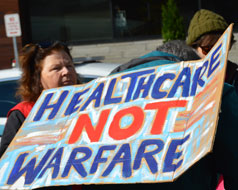 With an economy
as wealthy as the U.S., the problem is not a lack
of funds, it is the
direction of the country based on a war economy
and government. It is
private control of the wealth produced by working
people by a handful
of oligarchs for their own private interests.
Indeed, the country's 651
billionaires have gained so much wealth just
during the coronavirus
pandemic that they could fully pay for a one-time
$3,000 stimulus
cheque for every child, woman and man in the
United States -- and still
be wealthier than they were before the crisis.
With an economy
as wealthy as the U.S., the problem is not a lack
of funds, it is the
direction of the country based on a war economy
and government. It is
private control of the wealth produced by working
people by a handful
of oligarchs for their own private interests.
Indeed, the country's 651
billionaires have gained so much wealth just
during the coronavirus
pandemic that they could fully pay for a one-time
$3,000 stimulus
cheque for every child, woman and man in the
United States -- and still
be wealthier than they were before the crisis.
Refusing to address this reality of self-serving private ownership and the war economy, elected officials are making more threats that no relief or budget will be passed December 18, despite soaring COVID-19 cases and deaths, now more than 300,000, and hospitals packed and unable to provide for patients or workers. It is a crime.
Decision making needs to be in the hands of the people. Elected officials need to get out of the way or join the people as they step up organizing for their right to govern and decide.
(Photos: TML, VOR, California Nurses Assn)
Nineteen Tragic Facts About the COVID-19 Economy
87 million
87 million workers will lose federally mandated COVID-19 sick leave at the end of December unless Congress acts to extend the law.
50 million
50 million people are now facing hunger at least once a month, including one in four children. The rate of adults who sometimes or often do not have enough to eat is double in Black and Latino homes, according to the Associated Press.
30 million
30 million people are facing eviction as of December 31, 2020 when the current Centers for Disease Control moratorium on evictions ends. There has been a 70 per cent increase in the number of people paying their rent by credit card.
16 million
16 million unemployed workers have already lost or will lose their federal unemployment benefits by December 26, 2020. 4.4 million people have already exhausted their federal benefits and another 12 million people stand to lose their unemployment benefits by December 26, 2020 unless Congress passes new laws, according to the Century Foundation.
12 million
As many as 12 million people who were entitled to the $1,200 stimulus cheque never received it.
10 million
Two major national law firms and several national restaurant chains received $10 million dollars each from the Paycheck Protection Program. More than 25 per cent of the $500 billion in aid went to just one per cent of borrowers.
7 million
7 million more Americans, about 11 per cent, now live in poverty, than did months ago when the $600 Federal Pandemic Unemployment Compensation program was operating. (NBC News)
2.2 million
Since January, 2.2 million women have lost or quit their jobs or are no longer looking for work because mothers have been forced to choose between caring for their children and their jobs.
1.5 million
Of the record high 1.5 million homeless children in the U.S., over 400,000 have dropped off their school's radar during the pandemic. (Education Week)
1.4 million
One million four hundred thousand children have tested positive for COVID-19. (American Academy of Pediatrics)
110,000
One hundred and ten thousand restaurants have closed permanently, according to the National Restaurant Association.
106,000
At least 106,000 nursing home residents and staff died from COVID-19 as of early December, around 39 per cent of the overall deaths reported. (NBC News)
600 per cent
Failure rates in math and English jumped 600 per cent among low-income students in some school districts recently in Maryland. Nationally grade school students are falling significantly behind in math and the percentages may even be worse because a large percentage of students were not even present when testing was done. Several states report that many fewer children enrolled back in school this fall than were there a year ago.
400 per cent
COVID-19 rates are 400 per cent higher in state and federal prisons than among the general public and the death rate is more than twice as high. National Commission on COVID-19 and Criminal Justice.
400 per cent
Black, Hispanic and Native Americans are four times as likely to be hospitalized for COVID-19 than whites. (CNN)
200 per cent
The risk of being exposed to COVID-19 at the grocery store is twice as high in low-income neighborhoods as in high-income neighborhoods.
37 per cent
African Americans are 37 per cent more likely to die from COVID-19 than whites; Asians are 53 per cent more likely; Hispanics 16 per cent.
31 per cent
There has been a 31 per cent increase in mental health emergency room visits for children since the pandemic began and an overall 24 per cent increase in emergency room visits for children. (Centers for Disease Control)
16 per cent
College applications are down 16 per cent from first generation students and lower-income students.
13
In 13 states, the unemployment benefits provided fall below the federal poverty line of $245 a week according to the Government Accountability Office.
(Popular Resistance, December 11, 2020. Photo: Stimulus Checks or Strike)
Matters of Importance in Latin America and the Caribbean
ALBA: 16 Years of Life
The Bolivarian Alliance for the Peoples of Our America-Peoples' Trade Agreement (ALBA-TCP) held its XVIII ordinary Summit virtually this time on December 14, with the President of Venezuela Nicolás Maduro as moderator. The meeting commemorated the organization's founding in Havana, exactly 16 years earlier, by the presidents of Cuba, Fidel Castro, and Venezuela, Hugo Chávez who conceived of it as an anti-neoliberal, supportive, non-competitive and popular alternative to the absolute predominance of profit and the market promoted by the United States through the Free Trade Area of the Americas (FTAA). The FTAA was defeated the following year, in 2005, at the Summit of the Americas in Mar del Plata, by the joint action of Presidents Chávez, Kirchner, Lula, Tabaré Vázquez and Duarte Frutos, backed by popular mobilization.
ALBA has benefited from important achievements such as Operation Miracle, which brought eye operations to improve the sight of more than 8 million low-income Latin Americans and Caribbean people; the eradication of illiteracy in Venezuela, Bolivia and Nicaragua and its appreciable decrease in other States of the Alliance, and the genetic-social clinical study of the population in six member countries. Of particular importance was the creation in Cuba of the Latin American School of Medicine and then a counterpart of it in Venezuela, which have contributed tens of thousands of doctors with humanistic training to remote places on four continents where they had never seen a doctor, including black communities in the United States.
Maduro
said that the foreign ministries have been working
together on a set of
proposals and documents to greet the year 2021
with strength and
dynamism. He put great importance on the relaunch
of Petrocaribe and
its economic area, which could not be done in 2020
due to the
unyielding U.S. economic blockade under Trump that
prevents Venezuela
from exporting oil and the Caribbean states from
importing it. The
timing of the summit was a chiaroscuro, taking
place under the ominous
weight of the international health and economic
crisis caused by
COVID-19, during which the rich countries of the
West have shown
unparalleled selfishness, procuring health
services just for themselves
at a time when solidarity and cooperation are most
necessary. But, at
the same time, when the rebellion of the peoples
of Latin America and
the Caribbean against neo-liberal governments is
on the rise, as can be
clearly seen in Chile, Peru, Colombia, Guatemala
and Haiti.
At
the same time, the Bolivian people have resumed
their liberating path
after their resounding victory in the October 18
elections, which
brought Luis Arce and David Choquehuanca to the
presidency and
vice-presidency of the country. Together with the
return of Evo
Morales, it constitutes an important defeat for
imperialism, the
right-wing forces and the Áñez dictatorship. Less
than
two months later, the Venezuelan people spoke in
their momentous
elections of December 6, which renewed the
National Assembly, granted a
large majority in that body to the Great Patriotic
Pole and dealt a
sharp blow to the destabilization strategy of the
United States and the
international right against the Bolivarian
Revolution. Equally
important was the re-election of Ralph Gonsalves
and Timothy Harris as
Prime Ministers of Saint Vincent and the
Grenadines and Saint Kitts and
Nevis, veteran ALBA member states in the Eastern
Caribbean.
The summit was mainly dedicated to analyzing the regional political situation, coordinating efforts among its member states to strengthen the fight against the pandemic, and assessing the important reincorporation of Bolivia as a member. The president of Cuba, Miguel Díaz-Canel, offered to provide epidemiological advice to the sister governments of the organization, share experiences with them on tackling COVID-19 and put at their disposal Cuba's successful protocols for combatting the virus with biotechnological medicines. The governments of Cuba and Venezuela were put in charge of organizing a common bank of medications and, mainly, vaccines against the novel coronavirus. The summit condemned the redoubling of the blockades and economic harassment of Venezuela, Cuba and Nicaragua by the United States.
In addition to those already mentioned, some of the main agreements reached related to the reactivation of the Economic Council of ALBA, and of the Sucre as the exchange currency, the activation of cryptocurrencies, the strengthening of Petrocaribe and the ALBA Bank, which offers assistance and financing to member states. The Summit also agreed to elect as the group's executive secretary the renowned Bolivian diplomat Sacha Llorenti, who was his country's representative to the UN.
(La Jornada, December 17, 2020. Translated from original Spanish and slightly edited for accuracy by TML. Photo: ALBA)
Day of the Titans and Heroic
Guerrillas
in White Coats
María Inés Álvarez Garay is a professor and collaborator of the Cuban Medical Brigade in Gambia.
Latin American Medicine Day is celebrated in Cuba and other countries of the Patria Grande in commemoration of the birth of the wise Cuban epidemiologist Carlos Juan Finlay.
Finlay was born on December 3, 1833 in Puerto Príncipe, Camagüey. His main contribution to world science was his explanation of the mode of transmission of yellow fever: the female of the mosquito species known today as Aedes Aegypti.
He earned universal gratitude, not only for this work, but also because he discovered and solved the terrible problem of childhood tetanus.
His example is an encouragement for those who, like he did, dedicate their lives to science, research, fighting disease, and making health care an everyday right of humanity.
Also in his honour, the government of Cuba created the "Carlos J. Finlay" Microbiology Prize that UNESCO awards every two years to researchers whose work on issues related to microbiology (immunology, molecular biology, genetics and others) has contributed in a prominent way to health. Its objective is to promote research and advances in microbiology.
At the event held for the 20th anniversary of the Speleological Society of Cuba, at the Academy of Sciences in Havana, on January 15, 1960, our dear Fidel expressed:
"The future of our country must necessarily be a future of persons of science, it must be a future of persons of thought, because it is precisely what we are cultivating the most; what we are cultivating the most are opportunities for intelligence."
Today Cuba has solid development in biotechnology research. It has fostered a strong scientific branch dedicated to the research and production of medical-pharmaceutical products obtained through genetic engineering and biotechnology, a solid industry of medicines and equipment for general medical use, in addition to currently having four vaccine projects against COVID-19 in different phases of clinical trials.
It is undeniable that there is no blockade or material limitations that can prevent the development of intelligence, when you have the will and the possibility of exercising thought. When, in addition, there is a social system that favors the full development of the human person; with a Revolution that has clearly expressed the political will to develop science, fostering the environment for it, creating the conditions and seeking the necessary resources; and with a Commander-in-Chief like ours, who was able to be ahead of his time and recognize the value of science for the development of humanity and the Homeland.
In the fight against COVID-19, the current president of Cuba, Miguel Díaz-Canel Bermúdez, acknowledged that the results that have been achieved in different areas "constitute a reliable example of the contribution that Cuban science is making to this battle."
And then there are our titans and heroic guerrillas in white coats, who, scattered throughout the world, tirelessly fight against diseases, who, fully engaging their humanistic consciousness and solidarity, delve into science looking for a better future for all, defending the everyday right to health.
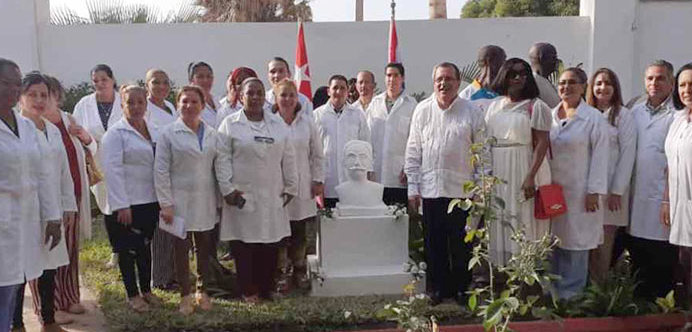
Cuban medical team in
Gambia to assist in the fight against COVID-19.
The Cuban Medical Brigade in Gambia is a continuation of the example of Carlos Juan Finlay, of the values we inherited from our eternal commander Fidel, our internationalist principles and our unconditional love to save lives and help those most in need with altruism and dignity.
Today we feel with pride that our path through this African country is well-trodden with actions and facts that speak for themselves, hundreds of thousands of people treated, lives recovered, successful surgeries, successful deliveries, dental care, diagnostic tests performed, that have made history in a mission that has already been reaping the love and gratitude of a people who know how to value their work and who are eternally grateful for their collaboration for more than 24 years.
Congratulations on Medicine Day!
(Rebelión, December 3, 2020. Translated from original Spanish by TML. Photos: Radio Rebelde, Cubacoopera Gambia)
Mexico's Water in the Hands of Private Interests
The control over Mexico's water by wealthy private interests is an important issue facing the Mexican people.
A study entitled The Water Millionaires (Los millonarios del agua), authored by Wilfrido Gómez Arias and Andrea Moctezuma and published November 23 by the Autonomous Metropolitan University (UAM), gives an overview of the situation based on analysis of data from the National Water Commission (Conagua) based on the Public Registry of Water Rights (Repda) for the use of surface and underground streams.
The report informs that 3,304 companies, civil society organizations and individuals use concessions totalling 13,183,000 cubic hectometres of water per year, mostly drawn from over-exploited aquifers. This amounts to 22.3 per cent of Mexico's water resources.
There are 6,247 users that each have a concession to extract around one million cubic metres, which represents 61.4 percent of the concessioned waters throughout the country. Among these are Petróleos Mexicanos and the Federal Electricity Commission, the report states, as well as breweries, steelmakers, agro-industries, mining companies, paper companies, automotive companies, bottlers, among other sectors across Mexico, especially in central Mexico, the southeast, the northwest and the Yucatan Peninsula.
The Mexican operations of ArcelorMittal (the world's largest steelmaker) use enough water each year to fill 100 and a half Azteca stadiums (which have a capacity of 87,523 people). It mainly extracts water in the Las Truchas common lands, where it has its largest open pit mine, and in the steel complex located in Lázaro Cárdenas, Michoacán. The water is primarily used for the production of steel, with the magnitude of the extraction of this natural resource reflected in the constant demands from surrounding communities for the remediation of lands affected by mining and its contamination. The gold mining companies GoldCorp and Buenavista, both part of Grupo México, are also major consumers of water. Contamination of water with arsenic, often used in gold mining, a chemical which can cause cancers of the skin, bladder, liver, kidneys and lungs, is also a problem in numerous communities.
Kimberly-Clark is another of the "water millionaires." It manufactures and distributes cleaning, personal care and hygiene products. It has been denounced for polluting rivers and springs in Veracruz, Querétaro and Michoacán, and has a concession of 27.3 million cubic metres of water per year.
There are banking institutions such as BBVA, which has water concessions in over-exploited aquifers, with 1.6 million cubic metres a year in the Atemajac, near Guadalajara, and Banco Azteca, with 2.2 million in the Mexico Valley. "The growing participation of banks as users of large water concessions continues to be a matter of concern" states the report, noting the possibility of the "creation of an international water market and control over water as a commodity becoming increasingly important, in the face of a future imminent degradation of that resource."
The researchers explain that there are no legal limits regarding the volumes of water that can be concessioned to individuals. This is due to the fact that in 1992 the Mexican Congress approved a National Water Law in order to give private investors greater certainty about their water rights. From 1993 to January 2020, Conagua has granted a total of 514,684 titles and permits, distributed among 361,600 users.
The National Water Law allows individuals to have water that is concessioned for different uses, which also helps them save millions of pesos in taxes by misreporting how the water has been used. In addition, one user might have concessions granted in the name of relatives, partners or representatives. Companies like Coca-Cola and Grupo Lala take advantage of this loophole, according to the investigation. "Hence, some companies have hoarded large amounts of water" to the detriment of the quality of the water and of the common good.
Regulations are required to close these loopholes to avoid "speculation" about the supply and demand for water. This would also allow Conagua to stop granting concessions on over-exploited aquifers and, likewise, guarantee the population their human right to water, the report states.
According to the researchers, of the 653 aquifers that exist in the country, 115 are over exploited. In 99 of them, large Latin American companies have concessions.
A study published by the statistics portal Statista highlighted that Mexico is one of the countries with the highest risk of running out of water. Based on data from the 2020 Ecological Threat Register, the country's water stress is one of the highest in Latin America, mainly due to the strong demand that exists in domestic, industrial and agricultural consumption.
(With files from La Jornada and news agencies. Quotations translated from original Spanish by TML.)
Concern in Peru Over
Increasing Number
of Missing Women and Girls

November 25, 2020. Women
march in Cusco, Peru on the International Day for
the Elimination of
Violence Against Women.
Peru's ombudsman's office recently expressed its concerns about the alarming increase in the number of women and girls who went missing in the country this year. According to its latest report "What happened to them?" published on December 12, at least 5,016 women, girls and adolescents have been reported missing between January and November 2020.
The office reported that 1,506 women and 3,510 girls and teenagers have disappeared during the past 11 months. In other words, an average of 15 women a day, or one woman every two hours, become victims of this serious crime.
In November alone, 190 women and 390 minors were reported missing. The figures represent an increase of 20 per cent and 12 per cent in disappearance of women and minors, respectively, as compared to the previous month.
The report noted that Lima, Arequipa, Apurimac, Callao, Cusco, and Piura are the departments with the highest number of missing women.
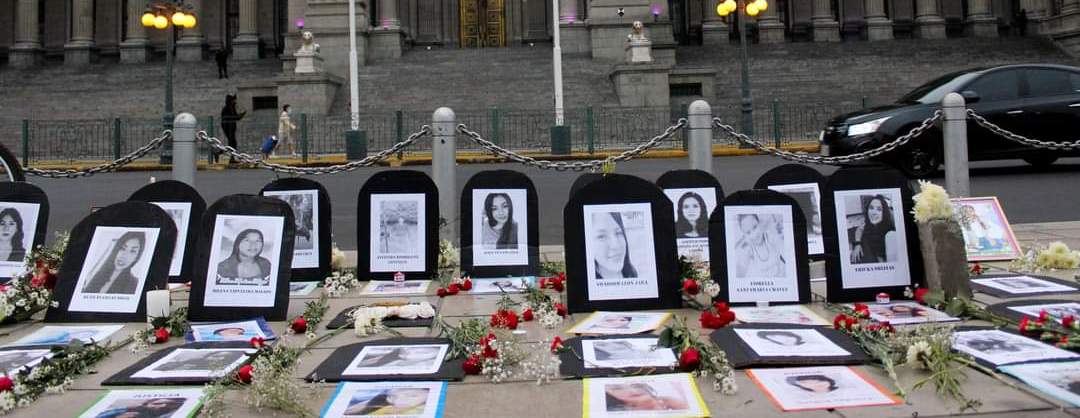
November 1, 2020.
Memorial to victims of femicide.
Furthermore, the ombudsman's office warned about the connection between the disappearances and the other serious crimes of violence against women. The public official highlighted that of the 127 victims of femicide registered in the last 11 months, 33 victims had previously been reported missing.
Likewise, the office pointed out that so far in 2020, there have been 188 attempted femicides and 50 violent deaths, which are still under investigation.
Additionally, there has been a significant increase in cases of domestic violence, rape and child sexual abuse this year.
According to the Ministry of Women and Vulnerable Populations, women's helpline #100 received over 11,000 calls to report sexual violence from January to November. Additionally, according to the Ministry of Health, 994 girls under 14 years of age were impregnated after being raped during the past 11 months.
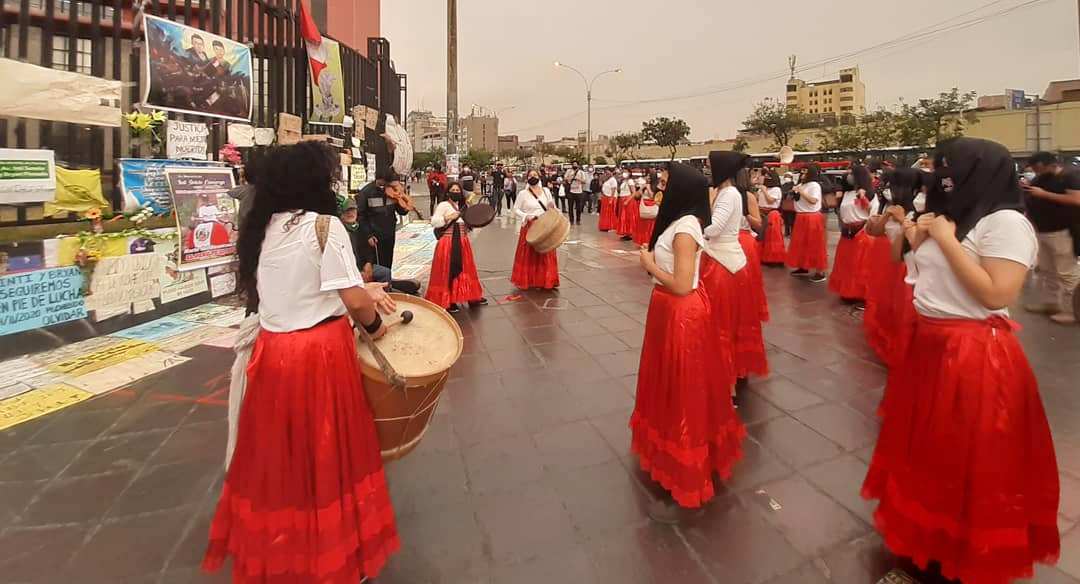
December 14, 2020.
Tribute organized for women who were sexually
abused by police, who
have not been held responsible.
The rates of femicide and violence against women across the region of Latin America and the Caribbean are at record highs. This year the incidents of violence towards women and girls have been aggravated due to the compulsory preventative home-quarantine to stop the spread of COVID-19.
On the International Day for the Elimination of Violence Against Women, November 25, as well as on December 10, International Human Rights Day, thousands of women, feminists, women's rights and human rights activists from across the region took to the streets and social media networks to urge governments to step up measures to address all forms of gender-based violence.
(People's Dispatch. Photos: F. Tristan, GTC Contreras, Mano Alzado)
COVID-19 Update
Ending the Year in the Red Zone and
Under
Lockdown
Total
cases of COVID-19 in Canada as of December 19,
2020 -- click to
enlarge. (PHAC)
The COVID-19 pandemic is generally worsening across the country. The total case count has now passed half a million as records continue to be set in various provinces for numbers of new daily cases, amidst a situation where neo-liberal governments continue to equivocate on providing the necessary health and safety measures in health care facilities and long-term care homes, or are outright attacking the workers and the public health care system.
Canada's Chief Public Health Officer Dr. Theresa Tam issued a statement on December 19, in which she gave an overview of the COVID-19 pandemic across the country. She explained:
"Since the start of the pandemic, there have been 495,346 cases of COVID-19, including 14,040 deaths reported in Canada; these cumulative numbers tell us about the overall burden of COVID-19 illness to date. Though many areas continue to experience high infection rates, it is important to remember that the vast majority of Canadians remain susceptible to COVID-19. This is why it is important for everyone to continue with individual precautions to protect ourselves, our families and our communities.
"At this time, there are 75,695 active cases across the country. The latest national-level data indicate daily averages of 6,653 new cases (Dec 11-17). COVID-19 is spreading among people of all ages, with high infection rates across all age groups. However, nationally, infection rates remain highest among those aged 80 years and older who are at highest risk for severe outcomes.
"Likewise, outbreaks continue to occur in high-risk populations and communities, including hospitals and long-term care homes, congregate living settings, Indigenous communities, and more remote areas of the country. The downstream impacts of weeks and months of elevated disease activity continues to be seen in still rising numbers of severe illness and death, significant disruptions to health services and ongoing challenges for areas not adequately equipped to manage complex medical emergencies.
"Nationally, hospitalizations and deaths, which tend to lag behind increased disease activity by one to several weeks are still increasing. Provincial and territorial data indicate that an average of 3,194 people with COVID-19 were being treated in Canadian hospitals each day during the most recent seven-day period (Dec 11-17), including 650 of whom were being treated in intensive care units. During the same period, there were an average of 115 COVID-19-related deaths reported daily. This situation continues to burden local health care resources, particularly in areas where infection rates are highest. These impacts affect everyone, as the health care workforce and health system bear a heavy strain, important elective medical procedures are delayed or postponed, adding to pre-existing backlogs.
"This week, we welcomed more exciting news on the vaccine front, from the first Canadians being vaccinated against COVID-19 to the prospect of early delivery of doses of the Moderna COVID-19 vaccine, pending regulatory approval assuring quality, safety and effectiveness.
"Even as we move into this hopeful next chapter of Canada's COVID-19 response, our collective efforts to bend the curve remain crucial to our success. The latest longer range forecasting, using a model from Simon Fraser University, forecasts that we could have over 8,000 cases daily by the beginning of January 2021. While lower than last week, these numbers are still significant and put us on a trajectory for a strong resurgence for the next two months. This underscores that the partnership between public health and the public at large is still vitally important to bringing down the infection rate. Our continued efforts are not only helping public health authorities to quickly interrupt chains of transmission, they also assist the broader health workforce to plan for and roll out one of the most complex immunization campaigns in Canada's history.
"While we continue to prepare the way for widespread and lasting control of COVID-19 through safe and effective vaccines, Canadians are urged to continue with individual practices that keep us and our families safer: stay home/self-isolate if you have any symptoms, follow local public health advice and maintain individual protective practices of physical distancing, hand, cough and surface hygiene and wearing a face mask as appropriate (including when you cannot consistently keep two metres apart from people outside your immediate household)."
Opioid Crisis Exacerbated by Pandemic
Dr. Tam in remarks on December 18 highlighted how the opioid and drug overdose crisis has worsened during the pandemic:
"National data released this week on opioid and stimulant-related harms is a tragic reminder of the broader impacts of this pandemic, including the worsening of the ongoing overdose crisis. From April to June, there were 1,628 opioid toxicity deaths in Canada, which is the highest number recorded in a single quarter since national surveillance began in 2016. Now more than ever, we must work together to curb this devastating trend, never forgetting that each and every opioid toxicity death represents a life cut short and a person whose loss is grieved by family, friends and community.
"The overdose crisis, and substance use more broadly, is a highly complex health and social issue. We know, however, that there are interventions that can and do save lives. Prior to the onset of the COVID-19 pandemic, we were seeing early signs that opioid toxicity deaths were declining in parts of the country. Sadly, as the latest data show, we are now seeing a loss in these hard fought gains, as COVID-19 and associated public health measures have impacted the toxic illegal drug supply as well as the accessibility of substance use supports.
"We can do more to save lives -- both during the COVID-19 pandemic and beyond -- and must redouble our collective efforts to expand the availability of evidence-based harm reduction services -- like supervised consumption sites and take home naloxone programs -- and of treatment options, including safer, pharmaceutical alternatives to the toxic illegal drug supply.
Vaccines
As concerns COVID-19 vaccinations, the Public Health Agency of Canada in a statement to CBC News stated that "Based on current data, by the end of Q3 2021, Canada projects having a sufficient number of doses to be able to offer a vaccination to every Canadian." This date is based on the fact that the Canadian government has signed purchase agreements with seven different pharmaceutical companies for up to 418 million doses of the various shots under development. This is said to be hedging bets in case some vaccines do not pan out as well as to give the possibility of donations to other countries. These companies are Pfizer-BioNTech (U.S.-Germany), Moderna (U.S.), Medicago (Canada), University of Oxford-AstraZeneca (UK-Sweden), Johnson & Johnson (U.S.), Novavax (U.S.) and Sanofi-GlaxoSmithKline (France-Britain).
Traditionally, anti-viral vaccines are based on weakened versions of a virus that is used to stimulate an immune response to the actual virus and thus convey immunity to infection from the live virus. However, the Pfizer vaccine (the first to be approved for use in Canada) and the Moderna vaccine instead carry the instructions for making a distinct spike protein on the outside of the coronavirus in the form of single-stranded ribonucleic acid (RNA). The spike protein is then produced within the human body to generate an immune response.
The vaccines being tested by AstraZeneca and Johnson & Johnson are somewhat similar, except the coronavirus spike protein is spliced into another virus called an adenovirus in the form of double-stranded deoxyribonucleic acid (DNA). This method was used to produce a vaccine for Ebola. Techniques based on RNA and DNA are said to have had a relatively shorter development time, as they are based on genetic sequencing of COVID-19 that was provided by China in January.
The Novavax and Sanofi-GlaxoSmithKline vaccines contain a coronavirus protein to stimulate an immune response.
The Medicago vaccine uses "living plants as bioreactors to produce non-infectious versions of viruses (called Virus-like Particles, or VLPs)."
Presently, Canada has acquired 4 million doses of the Pfizer-BioNTech vaccine, which requires recipients to receive two doses 21 days apart for maximum efficacy. The first doses were administered on December 14, to those deemed to be in priority groups. Every province is responsible for their own vaccine deployments. Preliminary guidance from the National Advisory Committee on Immunization (NACI) says that key populations to prioritize for vaccination are "those at high risk of severe illness and death from COVID-19" due to "advanced age" and "other high-risk conditions (to be defined as the evidence base evolves)." The NACI also advises prioritizing vaccinations for "those most likely to transmit COVID-19 to those at high risk of severe illness and death from COVID-19 and workers essential to maintaining the COVID-19 response," as well as "those contributing to the maintenance of other essential services for the functioning of society" and also "those whose living or working conditions put them at elevated risk of infection and where infection could have disproportionate consequences, including Indigenous communities."
(With files from Public Health Canada, New York Times, Novavax, Medicago.)
Note to Our Readers
With this issue, TML Weekly completes its publication for 2020. It will resume on January 30, 2021. We wish you a safe holiday and encourage everyone to take the time to consider and discuss the serious developments taking place in Canada and around the world, and how to effectively intervene in the new year.
Please continue to send us your reports, photos and views, and keep up to date with the CPC(M-L) website and calendars of events for important announcements.
We thank you for your support in 2020 and call on you to consolidate it in the new year by sending your reports and views and also making an effort to increase the readership of TML Weekly and other Party publications as well as by helping to fund this important work.
Wishing you all safe holidays and all the best in the New Year.Technical and Editorial Staff of TML Weekly.
(To access articles individually click on the black headline.)
Website: www.cpcml.ca Email: editor@cpcml.ca
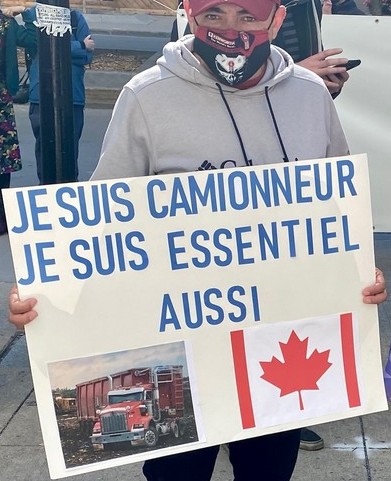 News of the
continuing CEWS government payments to TFI, the
share dividend, stock
buyback and options, strong gross income and
profits, and layoffs of
1,600 workers sent its stock price soaring on the
New York Stock
Exchange, increasing the paper wealth of its
owners. The situation for
the executives in control of the company and
owners of stock, unlike
the laid-off workers, was so positive that CEO
Bédard in the
fall increased the share dividend payout by 12 per
cent.
News of the
continuing CEWS government payments to TFI, the
share dividend, stock
buyback and options, strong gross income and
profits, and layoffs of
1,600 workers sent its stock price soaring on the
New York Stock
Exchange, increasing the paper wealth of its
owners. The situation for
the executives in control of the company and
owners of stock, unlike
the laid-off workers, was so positive that CEO
Bédard in the
fall increased the share dividend payout by 12 per
cent. Some
in the media and certain economists became
critical of the CEWS
pay-the-rich program implying that it was poorly
thought out and
presented, which left it open to criticism. Some
pointed to other
jurisdictions where the schemes of governments to
pay the wages of
workers on behalf of private enterprises were
better disguised and not
so easy to see through the corruption. The economy
is now openly seen
to be a pay-the-rich corrupt economy under the
control of the global
oligarchy and in need of a new direction.
Some
in the media and certain economists became
critical of the CEWS
pay-the-rich program implying that it was poorly
thought out and
presented, which left it open to criticism. Some
pointed to other
jurisdictions where the schemes of governments to
pay the wages of
workers on behalf of private enterprises were
better disguised and not
so easy to see through the corruption. The economy
is now openly seen
to be a pay-the-rich corrupt economy under the
control of the global
oligarchy and in need of a new direction.
 One item in the
series examines the Canada Emergency Wage Subsidy
program (CEWS). Up to
December CEWS has handed $50 billion to around
356,000 companies to pay
the wages of their employees. The program has been
extended into next
year with the total payments expected to exceed
$100 billion. According
to the government, the money was to assist small
retail and other
businesses to keep their workers employed. Smaller
retailers in
particular are in danger of going bankrupt as the
enforced COVID-19
lockdowns have hit them hard. Many of the most
powerful global cartels,
however, use it as a pay-the-rich scheme, leaving
a scam of tremendous
proportions in their wake.
One item in the
series examines the Canada Emergency Wage Subsidy
program (CEWS). Up to
December CEWS has handed $50 billion to around
356,000 companies to pay
the wages of their employees. The program has been
extended into next
year with the total payments expected to exceed
$100 billion. According
to the government, the money was to assist small
retail and other
businesses to keep their workers employed. Smaller
retailers in
particular are in danger of going bankrupt as the
enforced COVID-19
lockdowns have hit them hard. Many of the most
powerful global cartels,
however, use it as a pay-the-rich scheme, leaving
a scam of tremendous
proportions in their wake.


